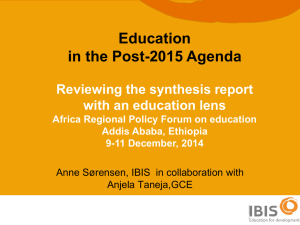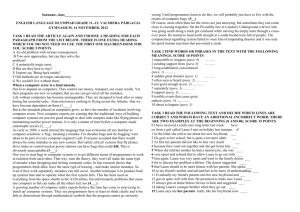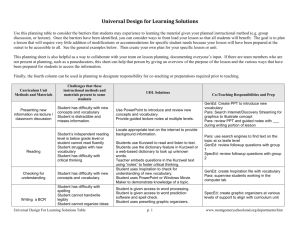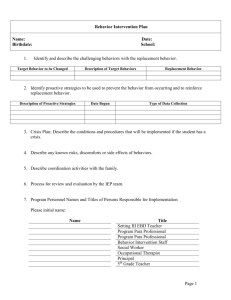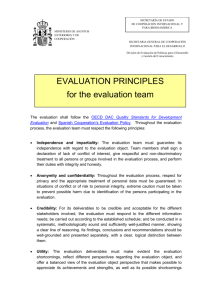users` perceptions of research and its influence on their practices
advertisement
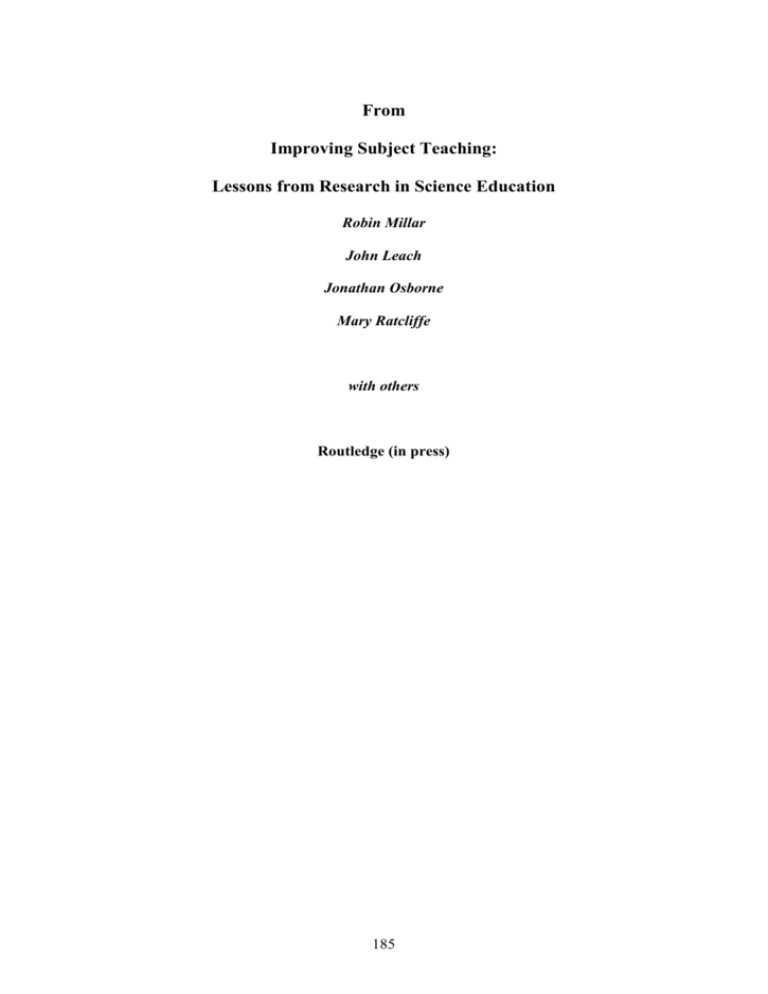
From Improving Subject Teaching: Lessons from Research in Science Education Robin Millar John Leach Jonathan Osborne Mary Ratcliffe with others Routledge (in press) 185 Chapter 8 From evidence to impact: Users’ perceptions of research and its influence on their practices Mary Ratcliffe, Hannah Bartholomew, Vicky Hames, Andy Hind, John Leach, Robin Millar and Jonathan Osborne The previous chapters have viewed the research-practice interface from the researchers’ perspective. In this chapter we turn to the perceptions of research in science education of potential users of that research. Research evidence that a particular teaching practice is successful in achieving its intended outcomes (Chapter 5), or that carefully designed teaching materials can stimulate the kinds of changes in practice that the designers intended (Chapter 6), or that certain factors are associated with more successful teaching (Chapter 7), is of little value unless it is noted by the practitioner community and regarded as credible. Even then there may be barriers to practitioners’ use of research evidence in modifying their teaching. In one of the four projects undertaken by the Evidence-based Practice in Science Education Research Network, we interviewed a sample of practitioners, and held a series of focus group discussions, to explore the extent to which practitioners in science education think their practice is influenced by research, and to assess the value they place on research in making everyday choices and decisions. One aim was to identify factors which facilitate and inhibit the use of research evidence, as this may be important in thinking about how best to communicate research to practitioners. 186 BACKGROUND As discussed in Chapter 1, teachers draw on a range of types of knowledge in the course of their everyday practice (Figure 1.1). Educational research may have a direct or indirect influence on teachers’ decisions and choices. Professional knowledge, including that of research, does not come from a single source. Reading may contribute to a teacher’s knowledge base. The practice of teaching is, however, strongly influenced by local craft knowledge which is socially constructed and communally shared; ‘like other learners, teachers construct their knowledge through social interaction with peers, through applying ideas in practice, and through reflection and modification of ideas’ (Marx et al. 1998: 670). Several studies of reflective practice have focused on professional interactions and reflection within the school context (Day 1999; TurnerBissett 1999) but without giving explicit consideration to influences of research knowledge. Few empirical studies have explicitly explored research as an element in teachers’ professional knowledge base. An exception is the study by Barnett and Hodson (2001) of six exemplary science teachers. This suggests that, whilst research knowledge is used by teachers, it influences practice less than professional or pedagogical content knowledge based on experience. Models of reflective practice attempt to capture the complexity of individual decision-making. In our work, we did not set out to evaluate the influence of all the sources of professional knowledge included in such models but rather to focus on the extent to which research processes and evidence influence practitioners’ actions. In seeking teachers’ and other science education practitioners’ views of educational research, we were asking them to reflect on their practice and to consider the extent to which research evidence forms part of 187 Figure 1.1 Influences on teachers’ decision making Task or problem deciding how to teach a specific topic or implement a specific change in practice Initial teacher training Continuing professional development choose an existing intervention or develop a new one influenced by Teachers’ professional knowledge: of subject of subject pedagogy (PCK) of curriculum and materials about learning about context about learners which comes from Professional milieu: textbooks and resources colleagues Research Experience Teaching intervention overall plan and materials for classroom use diagnostic data/reflection on outcomes and events 185 their professional knowledge base and could be an agent of change in their practice. This approach assumes that practitioners have the ability to reflect on their own practice in the interviews and focus group discussions, even though the knowledge on which it is based may sometimes be largely tacit, or difficult to articulate. Some studies have shown the positive disposition of some teachers, particularly those in senior management positions, towards the influence of research findings on their practice in general (for example, Galton 2000; DETYA 2001b). The implication of such studies is that many teachers are open to using research evidence to modify their practice. Knowledge of research findings is a first step. However, it would appear that developing knowledge of research methods and findings does not feature strongly in science teachers’ views about the professional development they require (Shkedi 1998; Costa, Marques and Kempa 2000). Of course, there are teachers who do have extensive knowledge and experience of research, often gained through completion of a higher degree in education, through action research or collaborative work with researchers. Do such teachers have better access to, and make better use of, research evidence? There is some evidence that this might be the case from surveys and interviews with teachers in action research consortia (Cordingley 1999; Elliott 2000; McNamara 2002). Thus, in our study, teachers with and without research experience were included, in order to explore any differences in their perceptions of the impact of research on their practice. We deliberately focused on practice in the teaching of science, for the reasons outlined in Chapter 1. Teachers of science are engaged in teaching a body of content and skills. They do this in a variety of professional contexts – to diverse groups of students and 185 within a range of school settings. Despite this diversity, a characteristic feature of their practice is the subject they are teaching, and into which they have been socialised. In contrast, previous studies of research influence have tended to ignore subject-specific elements and explored research influence on teachers in general (DETYA 2001b; McNamara 2002). RESEARCH DESIGN In our study, we used a combination of interviews and focus groups to explore views in depth. Some studies have relied on data collection through questionnaires, thus limiting the extent to which reasoning and views can be probed (Galton 2000). Others have undertaken case studies of a few teachers in great depth (Barnett and Hodson 2001). Our approach takes a middle way, providing depth of analysis whilst canvassing views from a representative sample of reasonable size. We interviewed 62 practitioners and conducted six focus groups – three of primary teachers and three of secondary teachers. The interview sample consisted of: 21 experienced science teachers with no formal experience of research: ten primary (identified as P1 in extracts cited below) and eleven secondary (S1); 20 experienced science teachers with experience of research: eight primary (P2) and twelve secondary (S2); 21 other science education practitioners (SEP): four curriculum policy makers (from government bodies like the Qualifications and Curriculum Authority (QCA) and the Office for Standards in Education (OfSTED)), four textbook authors, four leading 186 participants in recent science curriculum development projects, eight providers of initial and in-service training from the higher education, local education authority and independent sectors, and one chief examiner. (Several others in the sample also had examining experience in addition to their primary role.) The interview began by seeking perceptions of the influence of research on interviewees’ practice. We deliberately chose not to define ‘research’ at the beginning of the interview, but used a Card Sort activity later in the interview to elicit participants’ views on research. Each card showed an activity that might or might not be construed as research. All of these activities involved gathering and analysis of data but with different purposes and conducted by different kinds of people (professional researchers, inspectors, advisors, teachers). Interviewees were asked whether they would classify each activity as research or not, and why. Our interest lay not so much in their choices as in the reasons for these. Subsequent questions explored the role interviewees saw for research in improving practice, where they would look for ideas to improve aspects of their practice, and how they would evaluate changes in their practice. The focus groups complemented the interviews by exploring which research findings, if any, were seen as convincing and likely to stimulate a change in practice. The discussion aimed to establish teachers’ perceptions of the extent to which research can provide general guidelines for practice, and their views on what counts as ‘evidence’ in relation to choices and decisions they might make in their everyday practice. To focus the discussion, we wrote eight short vignettes of real examples of educational research, each about one page in length, with a range of research foci and methods. Each vignette 187 included a summary of possible implications for a particular science education practice and contained a reference to the published source, usually a journal article or research report. Participants were sent these vignettes in advance. Questions in the focus group stimulated discussion on: whether participants were familiar with the research outlined in the vignettes; the extent to which they found the research convincing or credible, and why; the ways in which the research in the vignettes might be likely to influence their practice. PRACTITIONERS’ PERCEPTIONS Rather than attempting here to summarise the outcomes of this study, we will focus more selectively on some points that relate particularly to issues raised in other chapters. Fuller reports of this study of practitioners’ views of research are available elsewhere (Ratcliffe et al. 2004, 2005). In this chapter we will look particularly at: teachers’ perceptions of the influence of research on their teaching of science; the characteristics of research evidence that teachers see as persuasive (and perhaps as requiring a change in practice); how teachers would evaluate a change in their own practice. In the account that follows, all subjects’ names are pseudonyms. The paragraph number after each quotation locates the passage in the transcript of each interview or focus group discussion. 188 Teachers’ perceptions of the influence of research on their teaching of science Teachers’ views of the influence of research on their practice indicate the extent to which they feel it is already research evidence-informed or research evidence-based. Almost every interviewee said that they thought research did influence their practice, though views differed widely as to how large its influence was. A small number of teachers considered research to be a major influence: I’d put it as quite a major one really … it is an area which I possibly want to go into myself, because I’m so fascinated by it. I love the idea of lifelong learning, always finding out more. (Colin, P1, para. 56) Few were specific, however, about how their teaching was influenced by research, pointing to very general aspects. Ken (S2), for example, rated the influence of research as ‘enormous. I’m a much better teacher now than I was. Much more tolerant.’ (para. 36). Some who felt the influence of research was substantial also noted that its influence was often ‘hidden’ or invisible: I think, probably, research does have a big effect. But because I’m not using it directly, I’m not regarding it as a big effect, do you know what I mean? I feel that I’m sort of down the line from it, you know. (Janice, P1, para. 202) A high proportion of the teachers who saw research as a major influence on their practice had had some personal experience of research. Most teachers with no personal 189 experience of research saw it as a relatively minor influence on their practice. The following two responses are typical of others: I’d say, probably, a relatively modest influence. (Ursula, P1, para. 115) I: Do you think that what you do in your teaching is influenced by research? T: Not much. Very little I would say, these days. (Tony, S1, para. 16) Again, some in this group saw research as playing an indirect or ‘hidden role’ (Louise, P1, para. 226). Sally (S1), for example, who saw the influence of research as ‘relatively minor’, commented: I’m unaware of things that I might use that I’ve found out from research. I may absorb things from staff or training days or courses that have been found out or are based on research, but I’m not really aware. (Sally, S1, para. 42) Most interviewees and focus group participants therefore indicated or implied that research had some influence on their practice. It is difficult to gauge, from these initial responses alone, the extent to which the practice of such teachers could be said to be research evidence-informed. They appear open to considering research evidence and to view it as a positive influence. Further questions then explored in more detail their perceptions of the ways in which research might influence their practice. A small number of interviewees were able to give an example of a specific and direct influence of research on their teaching. If we can take teachers’ expressed views as an accurate 190 reflection of their practice, then some teachers do act on research evidence to modify their practice. Carol, for example, reported that: One piece of research I’d read suggested, contrary to all I’d always thought, sit the boys together. So I thought OK, I’ll give that a go and see what happens, and in the class that I had two years ago, a year two class, I tried that for a while. I altered my seating arrangements to see what would happen. (Carol, P2, para. 53) Examples of a direct influence of research on practice were, however, mostly about general teaching or organisational strategies, such as ways of grouping pupils, rather than ways of teaching specific science topics, ideas or skills. Even those who cited particular pieces of research as influential were often unable to identify clearly the impact on their actions. For example, Richard referred to: … research by Lovell that I was exposed to when I was training ... about the intuitive control of variables, the fact that students perhaps up to the age of 16, the average student is unable to consciously control one variable. That pervades a lot of work that I do, course work, experimental planning and that kind of thing. (Richard, S1, para. 20) He was not, however, able to describe how his practice took these ideas into account. Even when teachers indicated they were aware of research in specific areas, their lack of comment on how this research had affected their teaching suggests that knowledge of research is just a first step; a significant and challenging task remains in adapting and 191 using its findings or insights in a practical and effective manner in the classroom. Simply making teachers more aware research, and better informed about it, is therefore unlikely to lead to significant or widespread changes in practice. A more widespread perception, coming out of both interviews and focus groups, is that research influences teaching by less direct means. Major research projects which had produced output in the form of curriculum resources and teaching materials were commonly mentioned as ways in which research informs and influences everyday practice. In over half of all interviews and focus group discussions, one or more research-based projects such as CASE (Cognitive Acceleration through Science Education), AKSIS (ASE/King’s Science Investigations in Schools) and CLISP (Children’s Learning in Science Project) were spontaneously mentioned. Teachers recognised these as outputs of research projects. But their comments suggest that it was the materials rather than the research evidence that they valued. Adoption of the materials tends to precede any consideration of the research evidence. For example, Patrick talked of the extent of change involved in taking on a research-informed teaching intervention, but did not mention the research evidence about its outcomes as a factor in deciding to make this change: Originally, CASE …came to us just as … thirty lessons … They were a very different style to the way that most of us were used to teaching. But gradually we learned, and from going and finding out about the research, we learned that it had the biggest knock-on effect if it affected your whole teaching strategy. (Patrick, S1, para. 21) 192 Hazel expressed very clearly a view shared by several others that new teaching interventions are adopted primarily because of their perceived usefulness, with research evidence playing at best a supporting role: When we talk about it we wouldn’t think to ourselves ‘oh, my word, we are using research now’. We think this is a good idea and it fits in with our ethos and so we will try it. We will do that first and then we might look at the research findings that have backed it up. But we wouldn’t look at research first and say ‘oh, there are so many more improved results, therefore we will do it’. (Hazel, S2, para. 54) The subordinate role of research also emerged when practitioners were asked where they would seek advice and ideas for improving an aspect of their practice. No interviewee spontaneously identified research as the source to which they would first look. Most referred instead to: … talking to colleagues, that’s a vital interchange of ideas, I think, in terms of I tried this and it worked really well, or I tried that and it fell flat on its face, or whatever. (Pauline, S1, para. 28) Often colleagues, local authority advisors, or other in-service providers were seen as having knowledge or experience of research, and many interviewees saw this as an important means by which research influenced practice. Theresa, for example, talked of sharing information with colleagues about a piece of research which had impressed her: 193 I went on a course, some years ago now and it’s the first time that I came across ‘Inside the Black Box’ about formative assessment and that the research on that and I was particularly interested in that and so I circulated the information. (Theresa, S2, para. 35) These examples suggest that one important means of transforming practice is by offering resources, instruments and strategies which teachers, as a community, value and may adopt – accepting that even where these are informed by research, users may be unaware of this influence. Some research in social psychology suggests that changing behaviours depends on first changing beliefs and attitudes (Ajzen and Fishbein 1980). Others, however, have shown how changes in practice, even those imposed from outside, can lead to changes in opinions and values, if they are judged with hindsight to have had beneficial effects (Vulliamy 2004; Webb et al. 2004). Thus research-informed teaching materials, if designed in such a way that teachers can quickly see their potential usefulness, may be a particularly effective bridge between research and practice. Teachers’ judgment of research evidence as persuasive of a change in practice Teachers’ views on educational research provide an insight into their understanding of educational research methods and of the kind of knowledge it can produce. These views may help to identify some of the obstacles to the direct use of research evidence. At a general level, in distinguishing between activities they had classified as research and non- 194 research, interviewees argued that research was: enquiry with a purpose in mind; carried out in a systematic and objective manner (often using controls or comparisons); intended to inform action; and more credible if it was large scale. In contrast, activities classified as ‘not research’ were characterised as: just collecting information; part of normal practice; subjective; or small scale. Commonly, as in the two extracts below, interviewees used just one or two of these features to justify their classification of each activity discussed: It’s for a purpose… you’re trying to establish some good practice or other. You’re trying to improve your teaching or … your resources. (Nancy, S2, para. 156) Research involves more than just one group, it should have different groups of … children or whatever … to have perhaps a control group and compare how those groups would do in different circumstances, and what would impact on that, and then hopefully draw a conclusion to answer the hypothesis. (Ursula, P1, para. 87) Many teachers without research experience professed limited understanding of criteria for evaluating research studies or their findings, notwithstanding their willingness to comment generally on purpose and methods. Some features of research were notable by their absence. For example, no interviewee suggested that a research enquiry should have a clear theoretical or conceptual framework, although five (like Ursula above) did argue that having a prior hypothesis was an important criterion. The dominant emphasis was on systematic empirical enquiry – comparing cases, or seeking evidence of correlations that might indicate possible causal links. For some this was seen as making the research ‘scientific’. As Louise put it: 195 … the idea of control classes. For me tends to put it more on a scientific sort of basis. (Louise, P1, para. 148) On these issues, differences between teachers with and without research experience were not great. Those with research experience did, however, tend to articulate clearer views on the nature of research and were somewhat more prepared to envisage research taking a variety of forms, from individual action-research to large-scale studies. A teacher with research experience was clearly taking a broader view of research in putting all the Card Sort activities into the ‘research’ category: I would say that they all of them [the activities on the cards], in a sense, could come under research, small scale, and I know some teachers or LEA advisors doing their Masters or whatever would be expected to do some very small scale [research]. … I think these are …generating new knowledge, from the data and from practice. (Ralph, P2, para. 42) From the interviews as a whole, there appears to be no single common, or even dominant, view of the criteria which make an enquiry ‘research’ in science education. Rather, different activities are seen as research by different interviewees, provided they fulfil the central criteria of having a clear purpose and a systematic approach. About a third of interviewees mentioned both of these, and most of the remainder mentioned one. Many responses from all groups lacked specific detail, suggesting for instance that 196 data should be collected systematically but saying little about issues such as validity and reliability. The views of educational research held by teachers of science suggest that many are quite strongly influenced by their experiences or knowledge of research in science. Many, indeed, seem to have a rather idealised view of this, and show little awareness that medical research, for instance, ‘typically uses small sample experimental research as the basis for establishing the possibilities of effects’ and that ‘researchers recognise that mixed methods of research serve complementary purposes’ (Darling-Hammond and Youngs 2002: 15). Those who had themselves engaged in educational research were more prepared to accept as appropriate, and to see as ‘research’, a range of methods and designs. Many teachers appeared to lack a clear understanding of social science research, of its differences from research in the natural sciences, and of appropriate criteria for making judgments about its claims. Rather, their ideas were based either on models of empirical enquiry and hypothesis testing borrowed from the physical sciences, or on more diffuse lay conceptions of enquiry. The rigour of research methods and the scale and scope of data collection were also features which focus group teachers commented on in judging whether the research outcomes presented in vignettes could be regarded as convincing. For example, small scale studies were dismissed as providing insufficient evidence: T: A class of five, it’s not enough. I: So what would convince you? 197 T: Well you’d want to see something similar done in a variety of different schools with, you know, normal schools … (secondary focus group 1, para. 139-141) It’s not a convincing piece of research when you have such a small sample. Especially a hand picked sample, presumably. And not necessarily with your ordinary, average teacher either … (secondary focus group 1, para. 386) Focus group discussions also explored the extent to which findings might persuade teachers of the need to make a change in their practice. In all focus groups, some teachers said they would want to know contextual and background information before making a judgment about a piece of research, particularly if the claims made by the research appeared vague, or ‘too good to be true’. The following comment on one vignette is an example of this view: I just thought when I first read this …that there were just so many questions that I wanted to ask about it. So I've put it also as ‘some reservations’. I wanted to know more about the groups who did it and whether you have to do all 30 of them to get those - lots of those sorts of questions. I'm quite prepared to believe the trials, I just need a bit more back up information. (secondary focus group 1, para. 79) In making judgments about the extent to which findings can be generalised and, in particular, applied to their own context, several focus group members referred to the complexity of human behaviour: 198 T: I mean children are so complex, the human personality’s so complex that it’s so difficult isn’t it. I mean, the government can’t decide on MMR, which is reasonably straightforward compared with most educational research, it’s hardly surprising we can’t agree that something done in a classroom a hundred miles away is going apply to our classroom. T: Yeah, but there’s medical research, very sort of definite evidence, isn’t there? Not that there isn’t in educational research, but the nature of the evidence is a lot different, a lot more open to interpretation. (primary focus group 3, para. 600-602) The important issue here may be the clarity of the outcome measure. In many medical situations, the outcome is clear cut; the medical condition of the patient either improves or does not. In educational situations, the judgment as to whether better learning occurred, and the measurements that support this, are significantly more complex. Although issues of generalisability and methodological considerations (such as the use of comparisons and controls) were prominent in the discussion of what counts as research and as ‘good research’, one other factor was mentioned very frequently in discussing how persuasive a specific research finding was. Many teachers referred to the extent to which a finding resonated with their own experience, or was in line with their views and beliefs, or with their department’s policy and practice: 199 I tend to look at things that I can often relate to as either currently in my practice, or [...] that’s happened to me, and that’s a good way of solving that. (primary focus group 1, para. 244) I’m not convinced of the one about the less able pupils [vignette 3]. … I’m less convinced about that because of my experiences being the opposite. (primary focus group 3, para. 396) Thus, as Kennedy (1997) has also noted, research seems more likely to influence practice when the findings accord with experience or beliefs. The tendency for research findings to be used as confirmation of existing practice was echoed in focus group discussion. Although many agreed that research findings could provide new knowledge, there was also a feeling that this was more likely to be accepted when it confirmed the value of existing practice. Such comments are in line with a large Australian study (DETYA 2001b) which found that ‘generally teachers seek out the sources they believe will build on their existing knowledge.’ (p. 2). The implicit risk here is that research may convince practitioners only of things they believe they already know – with any surprising or unexpected findings being dismissed as ‘unconvincing’. Teacher education may have an important role in helping teachers to reflect more deeply on the nature of enquiry in education, so as to arrive at a more considered view of what is possible, and what might count as ‘sound evidence’ on which to base actions and decisions. 200 How teachers evaluate a change in their practice The strongly experimental view of educational research which many science teachers seem to hold might suggest that they would take a similar approach to evaluating changes in their own practice. The ways in which teachers say they would evaluate their own practice may also indicate their receptiveness to the idea that research findings might inform their practice, or that research could provide evidence to support specific choices and decisions about practice. More than three-quarters of the teachers interviewed talked about assessment of pupil attainment, in national tests and public examinations, as the most important evidence they would consider when evaluating a change in practice: … well, results obviously. Teacher assessments. So … at the end of a topic, say, some sort of formal assessment, national tests. (Yvonne, P1, para. 203) In terms of results it’s fairly easy to gauge. We do keep all our records on a central computer from year to year so we can see if there is an improvement there (Quentin, S2, para. 134) The outcome indicators to which teachers referred were almost always overall measures of attainment in science, rather than measures directly related to a specific change. In addition to external tests, many also referred to less objective indicators of improved learning that might precede a summative assessment: 201 It’s usually a personal, subjective judgment, when you’re actually teaching the subject that you feel they've got a far better understanding of it, and when they do their assessment the results which they produce there. (Jack, P1, para. 178) Teachers referred to a range of indicators of improvement. Several identified students’ reactions and responses during the teaching as their main indicator of success. In particular, the quality of verbal responses was highlighted: Personally it’s generally from verbal feedback from kids. I’ll question them and if they’ve picked up on what I’ve done or what they’ve done, and if I can see a change in the way that they are answering questions or the way they are talking back, then I’ll think it’s had an effect. (Ben, S2, para. 256) Well … you’ve got the gut feeling and the actions of the kids and the vocabulary they use, the kind of non-written signs and the more elaborate explanations they give, the kind of chronological or sequencing or cognitive good thought processes you can see going on, there’s that. The rounded feel you get to the lesson. (Colin, P1, para. 227) Richard referred in similar terms to quality of written work and evidence of ideas learned, but then went on to talk about pupil engagement and motivation; for many teachers, these were important indicators of improvement: 202 Quality of work, written work, ideas. So if you felt there was an improvement to something in a lesson, you would hope that that was reflected in the work of the students in some way, perhaps in some written work, their ideas, the quality of work, the number of books that got handed in when you next wanted them in, that kind of thing. So there'd be all those kind of factors. … If there was an improvement then you would expect, with the attendance, that would be measurable. You’d expect punctuality. There’d be enthusiasm, there'd be less level of disruption, you know, all of those factors. (Richard, S1, para. 159) For many practitioners this ‘gut instinct’ (Patrick S1, para. 124) came with experience and influenced how they prioritised, or even interpreted, different kinds of evidence in the decision-making process. The bases of professional judgment were difficult to articulate, but involved evaluation of pupils’ reactions in various ways: It’s difficult to describe it really. Sometimes you really know that it’s really gone well … the feedback you get back from the students … And sometimes you really try to do something and it just falls flat and you think, why didn’t that get a response. So you learn, I’m saying, I suppose, you learn through experience, through taking a risk, trying something new, seeing how it goes and taking it from there. (Pauline, S1, para. 164) The picture that emerged from interviewees’ comments on evaluation of change in their own practice is of professional judgment about the response of pupils to new methods and approaches, set against the background of an education system in which data on 203 pupil attainment currently plays a major role. Very few examples were given of systematic collection of specific evidence by teachers to reach conclusions about the effectiveness of a teaching intervention or innovation that they had chosen, or might choose, to adopt. CHANNELS OF INFLUENCE From this study, we would highlight two main points about the interface between research and practice. One is about the ways in which research findings and insights may influence decisions and choices – resulting in these being different from what they would otherwise have been. The other is about the role of research evidence in making judgments about specific practices. The first is therefore about research evidenceinformed practice, the second about research evidence-based practice, as we have used these terms (see Figures 1.1 and 1.2). Ways in which research might be said to influence practice can be divided into three categories: specific (where knowledge of a specific research finding influences a particular piece of teaching); general (where research is believed to support the use of a certain teaching style or approach); indirect (through using teaching materials, or following guidelines, that are considered to be informed by research). 204 The practitioners we interviewed gave very few examples of the first of these. Many made reference to the third. Whilst we might question the extent and depth of the ‘research influence’ on some of the teaching materials that are widely used, or the documents that set the framework for curriculum, assessment and teaching, examples of teaching materials that are clearly and explicitly informed by research were quite frequently mentioned. This suggests that the use of such materials may be one of the main ways in which research influences practice. Figure 1.2 Research evidence-based practic Influences may or may not include research Teaching intervention overall plan and materials for classroom use Research evaluation systematic data collection data and analysis open to public scrutiny yes Are intended learning outcomes achieved? Are unintended outcomes acceptable? Teaching intervention is ‘research evidence-based’ 205 no Taken as a whole, our interview data suggest that research findings are much more likely to have an impact on practice if they are used (perhaps by researchers and practitioners working together) to develop teaching materials or guidelines that can be directly used in the classroom. Communication of findings may raise awareness and knowledge, but is less likely to result in actual changes in actions and choices. In another sense, though, communication is vitally important. Many of those we interviewed talked of professional contacts, with colleagues, local authority advisers, teacher educators and researchers, as important in raising their awareness of research findings and approaches, helping them to identify developments that might be more worth attending to, and supporting them in trying out new approaches. Professional organisations, in particular the Association for Science Education, were often mentioned as important in this regard – and appear to play a key role in establishing and supporting a community of practice which values research, and seeks to use it as a resource to improve practice. As regards the role of research in evaluating practices, there was a striking contrast between the rigour of the criteria that many teachers appeared to apply in evaluating given accounts of research, and those that teachers said they would apply in judging the success of changes in their own practice. Whilst general measures of attainment in science were mentioned by several teachers, many also appeared to base judgments on rather intuitive outcome ‘measures’ rather than on specific data. Professional judgment, based on experience, the ‘feel’ of a change, and the students’ response, forms an 206 important qualitative yardstick for teachers. It would appear that the yardstick many respondents use to judge the outcomes of research is significantly more demanding than that which they use to assess their own practice. Finally, our findings suggest that any impetus towards research evidence-informed, or research evidence-based, practice is not coming from teachers. In one sense, this is unsurprising. Teaching involves a community of practitioners (Wenger 1998), and much of their knowledge of what constitutes good practice is embedded in social practices. However, the limited knowledge of research, and the relative weakness of the relationship between individuals’ practice and research, suggest that the teaching of science is a somewhat closed practice – that is, one in which its practitioners do not expect their more detailed choices and decisions to be warranted by rigorous and systematically collected evidence. Other professions, like medicine, are much more reliant on research evidence to improve practice. A shift in perception, towards seeing teaching interventions as ‘packages’ designed to achieve specific goals, whose attainment can be measured, may be necessary for research to become a stronger influence on the day-to-day events of practice. Summary Many science teachers consider that research does influence their everyday actions, but see this influence in very general terms, or through the fact that they use structures (such as a national curriculum and ‘official’ scheme of work) or resources (such as textbooks), which they believe to be ‘informed by research’. Communication of research findings to 207 teachers has a limited impact on practice. Teachers, however, appear willing to modify their practice, and to use of teaching strategies and materials based on research, when they can see the benefits of these in their own situation and believe they address current issues or concerns. Research evidence-informed practice is thus possible through targeted curriculum materials and approaches. Teachers’ professional networks also seem important in involving teachers in a community of practice where research is valued. To encourage research evidence-based practice, there may need to be a stronger focus in initial and in-service teacher education on teachers’ understanding of the strengths and limitations of educational research, so that more are able and confident to use evidence that has been systematically generated to evaluate their own and others’ practice. 208


